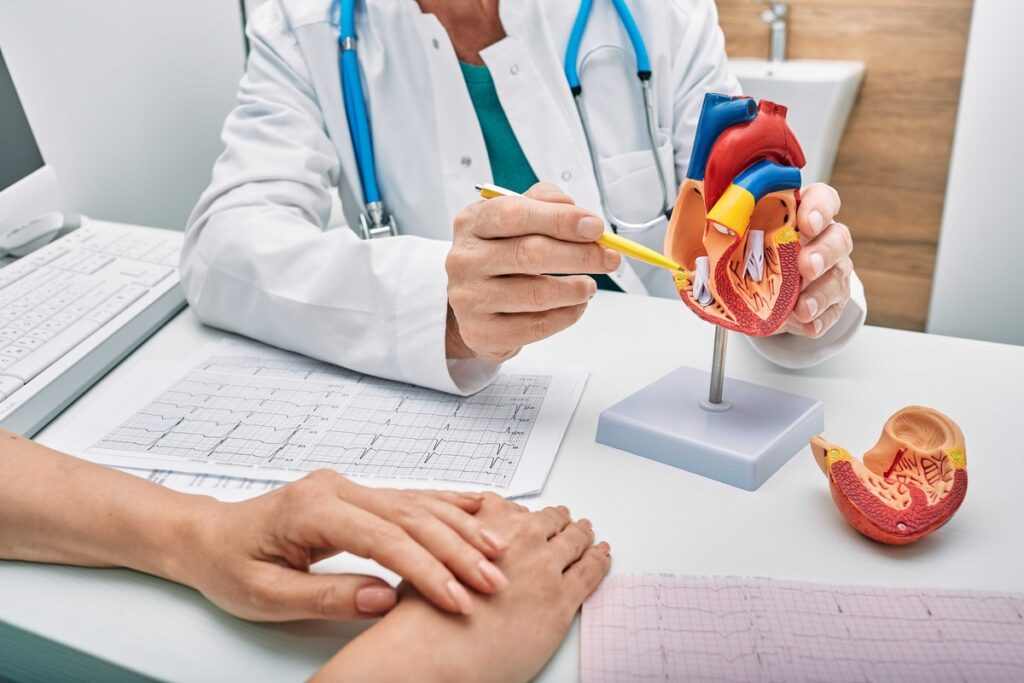Heart Attack Emergency Care in Texas
Heart Attack Treatment in Texas
Heart Attack Care by Expert Cardiac Specialists at Aether Health, Texas
Common Causes of Heart Attack
Coronary Artery Disease (CAD)
CAD is the most common cause of heart attacks. It occurs when the coronary arteries, which supply blood to the heart muscle, become narrowed or blocked due to the buildup of plaque (atherosclerosis). This restricts blood flow to the heart, leading to a heart attack.
High Blood Pressure (Hypertension)
Chronic high blood pressure can damage the arteries over time, making them more susceptible to blockages and increasing the risk of heart attacks.
High Cholesterol Levels
Elevated levels of LDL cholesterol (bad cholesterol) can contribute to the buildup of plaque in the arteries, narrowing them and reducing blood flow to the heart. This raises the risk of heart attacks.
Smoking
Smoking is a significant risk factor for heart attacks. The chemicals in tobacco smoke can damage the blood vessels, accelerate the formation of plaque, and increase blood clotting, all of which can trigger a heart attack.
Obesity and Poor Diet
Obesity, particularly excess abdominal fat, is associated with an increased risk of heart attacks. A diet high in unhealthy fats, cholesterol, sodium, and processed foods can contribute to obesity and raise cholesterol levels, hypertension, and diabetes, all of which are risk factors for heart disease.
Physical Inactivity
Lack of regular physical activity can lead to weight gain, high blood pressure, high cholesterol levels, and insulin resistance, all of which increase the risk of heart attacks.
Diabetes
Uncontrolled diabetes can damage blood vessels and nerves, increasing the risk of atherosclerosis and heart attacks. Individuals with diabetes are at a higher risk of heart disease compared to those without diabetes.
Stress
Chronic stress can lead to unhealthy coping behaviors such as overeating, smoking, and physical inactivity, all of which contribute to heart disease. Stress hormones like cortisol can also directly affect the cardiovascular system, increasing blood pressure and heart rate.
Family History
A family history of heart disease, especially if a close relative (parent or sibling) had a heart attack at a young age, can increase an individual's risk of experiencing a heart attack.
Age and Gender
The risk of heart attacks increases with age, and men tend to have a higher risk of heart attacks than premenopausal women. However, after menopause, a woman's risk of heart disease approaches that of a man's.
Heart Attack Symptoms
- Chest Pain or Discomfort: Chest pain or discomfort is the most common symptom of a heart attack. It may feel like pressure, tightness, squeezing, or fullness in the chest area. The pain can also radiate to the arms (usually the left arm), shoulders, neck, jaw, back, or abdomen.
- Shortness of Breath: Difficulty breathing or shortness of breath can occur before or during a heart attack. It may be accompanied by chest discomfort or occur independently.
- Nausea and Indigestion: Some people experience feelings of nausea, vomiting, or indigestion during a heart attack. These symptoms may be mistaken for gastrointestinal issues, but they can be indicative of a cardiac emergency.
- Sweating: Profuse sweating, often described as cold sweats, can occur during a heart attack. The skin may feel clammy, and the person may break out in a cold sweat without exertion or in response to minimal activity.
- Lightheadedness or Dizziness: A feeling of lightheadedness, dizziness, or faintness can occur during a heart attack. This symptom may be accompanied by weakness or a sense of impending doom.
- Fatigue: Unexplained fatigue or extreme tiredness, especially when it is sudden or disproportionate to exertion level, can be a warning sign of a heart attack.
- Pain or Discomfort in Other Areas: While chest pain is the hallmark symptom of a heart attack, some people may experience discomfort or pain in other areas of the body, such as the back, shoulders, neck, jaw, or arms (particularly the left arm).
- Anxiety or Panic: Feelings of anxiety, panic, or a sense of impending doom may occur during a heart attack. Some people may describe a feeling of overwhelming dread or a sense that something is terribly wrong.
Heart Attack Emergency Care Services in Texas
Rapid Assessment and Diagnosis
Cardiac Monitoring
Emergency Medications
Cardiac Catheterization and Interventional Procedures
Intensive Care and Critical Care Support
Collaborative Care Coordination
Patient and Family Education
Aether Health's Approach to Heart Attack Emergencies
